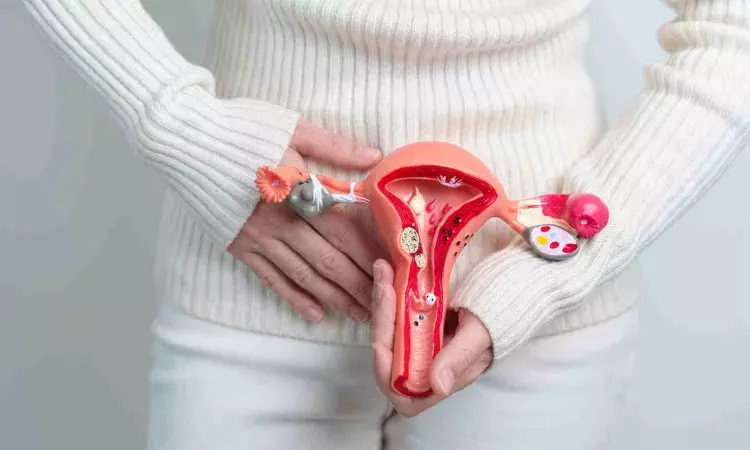- Home
- Medical news & Guidelines
- Anesthesiology
- Cardiology and CTVS
- Critical Care
- Dentistry
- Dermatology
- Diabetes and Endocrinology
- ENT
- Gastroenterology
- Medicine
- Nephrology
- Neurology
- Obstretics-Gynaecology
- Oncology
- Ophthalmology
- Orthopaedics
- Pediatrics-Neonatology
- Psychiatry
- Pulmonology
- Radiology
- Surgery
- Urology
- Laboratory Medicine
- Diet
- Nursing
- Paramedical
- Physiotherapy
- Health news
- Fact Check
- Bone Health Fact Check
- Brain Health Fact Check
- Cancer Related Fact Check
- Child Care Fact Check
- Dental and oral health fact check
- Diabetes and metabolic health fact check
- Diet and Nutrition Fact Check
- Eye and ENT Care Fact Check
- Fitness fact check
- Gut health fact check
- Heart health fact check
- Kidney health fact check
- Medical education fact check
- Men's health fact check
- Respiratory fact check
- Skin and hair care fact check
- Vaccine and Immunization fact check
- Women's health fact check
- AYUSH
- State News
- Andaman and Nicobar Islands
- Andhra Pradesh
- Arunachal Pradesh
- Assam
- Bihar
- Chandigarh
- Chattisgarh
- Dadra and Nagar Haveli
- Daman and Diu
- Delhi
- Goa
- Gujarat
- Haryana
- Himachal Pradesh
- Jammu & Kashmir
- Jharkhand
- Karnataka
- Kerala
- Ladakh
- Lakshadweep
- Madhya Pradesh
- Maharashtra
- Manipur
- Meghalaya
- Mizoram
- Nagaland
- Odisha
- Puducherry
- Punjab
- Rajasthan
- Sikkim
- Tamil Nadu
- Telangana
- Tripura
- Uttar Pradesh
- Uttrakhand
- West Bengal
- Medical Education
- Industry
Groundbreaking Study Reveals Link Between Endometriosis and Mental Health

Canada: In a groundbreaking development, a recent population-based cohort study has uncovered a significant association between endometriosis and mental health disorders. The findings of this study, published in the American Journal of Obstetrics and Gynecology, shed light on the profound impact of this debilitating gynecological condition on women's mental well-being.
The study found that regardless of the mode of diagnosis, endometriosis is associated with a marginally increased risk for mental health conditions. The increased risk, particularly evident in the years immediately after the diagnosis, underscores the need for proactive mental health screening among those with a new diagnosis of endometriosis.
Endometriosis, a chronic condition characterized by the growth of endometrial-like tissue outside the uterus, affects millions of women worldwide. Beyond the physical symptoms such as pelvic pain, infertility, and painful menstrual periods, the study delved into the psychological toll of living with endometriosis.
Although the physiological manifestations of endometriosis have been explored, its impact on mental health is less well-defined. Existing studies of endometriosis and mental health were conducted within diverse healthcare landscapes with varying access to care and primarily focused on surgically diagnosed endometriosis.
Against the above background, Ally Murji, Department of Obstetrics and Gynecology, University of Toronto, Toronto, Ontario, Canada, and colleagues aimed to assess the association between endometriosis and the risk for mental health conditions. They also evaluated differences between patients diagnosed medically and those diagnosed surgically.
For this purpose, the researchers conducted a matched, population-based retrospective cohort study in Ontario and included patients 18 to 50 years of age with a first-time endometriosis diagnosis between 2010 and 2020. '
Either medical or surgical diagnostic criteria determined endometriosis exposure. A medical diagnosis was defined using corresponding International Classification of Disease diagnostic codes from in-hospital and outpatient visits. In contrast, a surgical diagnosis was identified through inpatient or same-day surgeries. Individuals with endometriosis were matched 1:2 on sex, age, and geography to unexposed individuals without an endometriosis history.
The primary outcome was the first occurrence of any mental health condition following an endometriosis diagnosis. It excluded individuals with a mental health diagnosis in the two years before study entry.
Cox regression models were used to generate hazard ratios with adjustment for salpingo-oophorectomy, hysterectomy, pregnancy history, infertility, qualifying surgery for study inclusion, history of asthma, immigration status, diabetes, abnormal uterine bleeding, fibroids, hypertension, migraines, irritable bowel disorder, and nulliparity.
The study led to the following findings:
- The study included 107,832 individuals, 35,944 with an endometriosis diagnosis (29.5% medically diagnosed, 60.5% surgically diagnosed, and 10.0% medically diagnosed with surgical confirmation), and 71,888 unexposed individuals.
- Over the study period, the incidence rate was 105.3 mental health events per 1000 person-years in the endometriosis group and 66.5 mental health events per 1000 person-years among unexposed individuals.
- Relative to the unexposed individuals, the adjusted hazard ratio for a mental health diagnosis was 1.28 among patients with medically diagnosed endometriosis, 1.33 among surgically diagnosed patients, and 1.36 among those diagnosed medically with subsequent surgical confirmation.
- The risk of receiving a mental health diagnosis was highest in the first year after an endometriosis diagnosis and declined in subsequent years.
- The cumulative incidence of a severe mental health condition requiring hospital visits was 7.0% among patients with endometriosis and 4.6% among unexposed individuals (hazard ratio, 1.56).
"Future research should investigate the potential benefits of mental health interventions for people with endometriosis to enhance their overall quality of life," the researchers concluded.
Reference:
Thiel, P. S., Bougie, O., Pudwell, J., Shellenberger, J., Velez, M. P., & Murji, A. (2024). Endometriosis and mental health: A population-based cohort study. American Journal of Obstetrics and Gynecology, 230(6), 649.e1-649.e19. https://doi.org/10.1016/j.ajog.2024.01.023
Dr Kamal Kant Kohli-MBBS, DTCD- a chest specialist with more than 30 years of practice and a flair for writing clinical articles, Dr Kamal Kant Kohli joined Medical Dialogues as a Chief Editor of Medical News. Besides writing articles, as an editor, he proofreads and verifies all the medical content published on Medical Dialogues including those coming from journals, studies,medical conferences,guidelines etc. Email: drkohli@medicaldialogues.in. Contact no. 011-43720751


